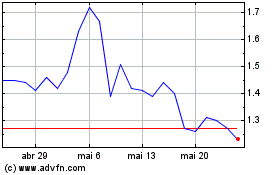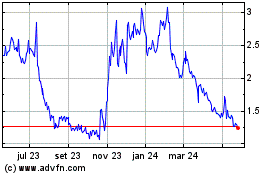U.S. FDA and CEL-SCI Agree on Use of PD-L1 Biomarker to Select Head and Neck Cancer Patients for Marketing Registration Study to Commence Q1 2025
07 Novembro 2024 - 10:15AM
Business Wire
- Biomarker used to select patients who are more likely have
favorable outcomes, supporting a successful confirmatory
Registration Study
- Patients with low PD-L1 expression treated with Multikine in
the target population had a 5-year survival of 73% vs. 45% in the
control group in the prior randomized controlled Phase 3
study
CEL-SCI Corporation (NYSE American: CVM) today announced
that in a recent meeting the U.S. Food and Drug Administration
(FDA) concurred with the Company’s approach to patient selection
using low PD-L1 tumor expression in its confirmatory Registration
Study for Multikine® (Leukocyte Interleukin, Injection)*. This
study will focus on the treatment of newly diagnosed locally
advanced primary head and neck cancer patients with no lymph node
involvement and low (TPS <10) PD-L1 tumor expression. This
Registration Study, slated to commence in the first quarter of
2025, will enroll approximately 212 patients and prospectively
confirm the favorable safety profile and the very favorable
efficacy results demonstrated in the target population in CEL-SCI’s
prior Phase 3 randomized study of 928 patients.
PD-L1 is a widely used biomarker for cancer patient selection
for checkpoint inhibitors, a class of cancer drugs representing a
$48 billion global market in 2023, led by pembrolizumab (Keytruda)
which is the top selling drug in the world with $27 billion in
estimated 2024 sales. While checkpoint inhibitors such as nivolumab
(Opdivo) and Keytruda appear to work best for patients with high
PD-L1 expression, CEL-SCI’s Multikine has been shown to be more
effective in patients with low PD-L1 expression, thereby uniquely
positioning Multikine as potentially a more effective drug for head
and neck patients, in whom about 70% have been shown to have low
PD-L1 expression. Since PD-L1 acts as a brake on the immune system,
Multikine can activate the immune system to fight cancer better
without the interference of PD-L1.
“To our knowledge, Multikine is the only neoadjuvant
immunotherapy that has shown overall survival benefit in the low
and negative PD-L1 head and neck cancer population. This
underscores the critical importance of having reached an agreement
with the FDA on the method for identifying and selecting patients
with low PD-L1 tumor expression for our upcoming confirmatory
Registration study,” stated CEL-SCI CEO Geert Kersten.
“Patient selection based on low PD-L1 as a biomarker can boost
the success of our upcoming confirmatory trial, further enhancing
our confidence based on the retrospective data from our Phase 3
study. We appreciate the ongoing dialog, exchange of ideas and
information with the FDA in support of CEL-SCI’s groundbreaking
work as we aim to treat an unmet need in cancer patients with low
PD-L1 expression.”
About CEL-SCI Corporation
CEL-SCI believes that boosting a patient’s immune system while
it is still intact should provide the greatest possible impact on
survival. Multikine is designed to help the immune system "target"
the tumor at a time when the immune system is still relatively
intact and thereby thought to be better able to mount an attack on
the tumor.
Multikine (Leukocyte Interleukin, Injection), a true first-line
cancer therapy, has been dosed in over 740 patients and received
Orphan Drug designation from the FDA for neoadjuvant therapy in
patients with squamous cell carcinoma (cancer) of the head and
neck. Based on the very strong data from the completed randomized
controlled Phase 3 study, the FDA concurred with CEL-SCI’s target
patient selection criteria and gave the go-ahead to conduct a
small, focused, confirmatory Registration Study which will enroll
212 patients. CEL-SCI will enroll newly diagnosed locally advanced
primary treatment naïve resectable head and neck cancer patients
with no lymph node involvement (determined via PET scan) and with
low PD-L1 tumor expression (determined via biopsy), representing
about 100,000 patients annually.
The Company has operations in Vienna, Virginia, and near/in
Baltimore, Maryland.
Forward-Looking Statements
This press release contains forward-looking statements within
the meaning of Section 27A of the Securities Act of 1933, as
amended, and Section 21E of the Securities Exchange Act of 1934, as
amended. When used in this press release, the words "intends,"
"believes," "anticipated," "plans" and "expects," and similar
expressions, are intended to identify forward-looking statements.
Such statements are subject to risks and uncertainties that could
cause actual results to differ materially from those projected.
Factors that could cause or contribute to such differences include
an inability to duplicate the clinical results demonstrated in
clinical studies, timely development of any potential products that
can be shown to be safe and effective, receiving necessary
regulatory approvals, difficulties in manufacturing any of the
Company's potential products, inability to raise the necessary
capital and the risk factors set forth from time to time in
CEL-SCI's filings with the Securities and Exchange Commission,
including but not limited to its report on Form 10-K for the year
ended September 30, 2023. The Company undertakes no obligation to
publicly release the result of any revision to these
forward-looking statements which may be made to reflect the events
or circumstances after the date hereof or to reflect the occurrence
of unanticipated events.
* Multikine (Leukocyte Interleukin, Injection) is the trademark
that CEL-SCI has registered for this investigational therapy. This
proprietary name is subject to FDA review in connection with the
Company's future anticipated regulatory submission for approval.
Multikine has not been licensed or approved for sale, barter or
exchange by the FDA or any other regulatory agency. Similarly, its
safety or efficacy has not been established for any use.
View source
version on businesswire.com: https://www.businesswire.com/news/home/20241107683131/en/
Gavin de Windt CEL-SCI Corporation (703) 506-9460
Cel Sci (AMEX:CVM)
Gráfico Histórico do Ativo
De Nov 2024 até Dez 2024

Cel Sci (AMEX:CVM)
Gráfico Histórico do Ativo
De Dez 2023 até Dez 2024
